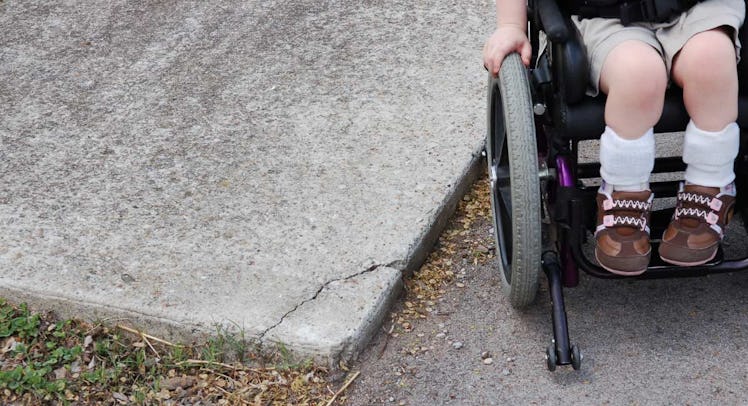Is My Daughter’s Disability Forcing Her Sister To Grow Up Too Fast?
Am I asking too much from her?

The following was syndicated from Medium for The Fatherly Forum, a community of parents and influencers with insights about work, family, and life. If you’d like to join the Forum, drop us a line at TheForum@Fatherly.com.
Social media certainly has its flaws. However, since I created this blog, I am becoming more aware of families and their struggle raising children where disability has to be accounted for.
Raising children is challenging enough. The difficulty level increases when you have to attempt to explain to your child that their sibling has a cognitive, physical medical disability or chronic and life-threatening illness.
Siblings of children with disabilities are forced to become more mature. It’s sometimes difficult to explain that their brother or sister has additional needs or special requirements that have to be taken into account ahead of their own needs.
No 2 children are the same. This difference is amplified when a sibling has multiple learning difficulties. This is currently something I am experiencing as a parent. Of course, with us, Sofiya is only 18-months-old, yet, countless times a day, I find myself explaining to her why she can not hold and interact with the toy that has been thrown at her by Olivia, who is wanting a reaction. Sometimes I have to stop her when she wants to sing songs or play “Row, Row, Row Your Boat,” because Sofiya’s sudden arms and leg movements can result in Olivia crying.
When Olivia becomes unsettled out of the blue, Sofiya comes running to reassure her. Recently she has been trying to pick Olivia up and loves holding her like you would a baby.
I try my best to include Olivia, but the reality is she doesn’t have as much energy as a toddler. Shortly after eating, she’s sleepy and as much as she loves playing, she definitely prefers cuddle time. Olivia has her own terms and routines.
An article on cerebral palsy family network lists 5 Ways To Help A Sibling Understand Your Child’s Cerebral Palsy. I’m not sure who wrote the article but something they included has stuck with me since I came across it, I think I was 6 months pregnant at the time.
“Children who grow up with a special needs sibling are often under more stress. They may feel guilty for being the ‘healthy’ sibling and try to overcompensate by setting higher expectations for themselves. They worry about taking care of their special needs sibling when they get older. Some children don’t understand what the condition is and worry that they might catch it too. They may even feel jealous or resentful because they are not receiving mom and dad’s full attention at a time when they need it most.”
There is also some great news!
According to the New York Langone Medical Center, growing up with a sibling with special needs has its benefits. These children tend to develop skills like problem-solving, flexibility, teamwork, and compassion. All of which are very important in the real-world.
Having a child with additional needs can be incredibly stressful on the whole family. Siblings can feel a whole bunch of emotions and feel short changed, but in the end, it’s important to teach them that the love for their sibling will prevail above anything. Of course, it ultimately depends on how you as the parent handle it and how well-explained the situation is for your kids.
We’ve always incorporated Sofiya in Olivia’s daily routine, explaining (whether she understands or not) what we’re doing and trying to get her to help in any way she can. Situations like these have allowed our daughters to share a special bond that’s incredible to see.
Nicole McClean is a mother of 2 and full-time Carer for my daughter who has cerebral palsy. Blogger & creator of Liv & Phea an inspirational family / Lifestyle blog stemmed from the passion & determination to raise awareness of all aspects of Motherhood, Disability and Mental Health.
This article was originally published on